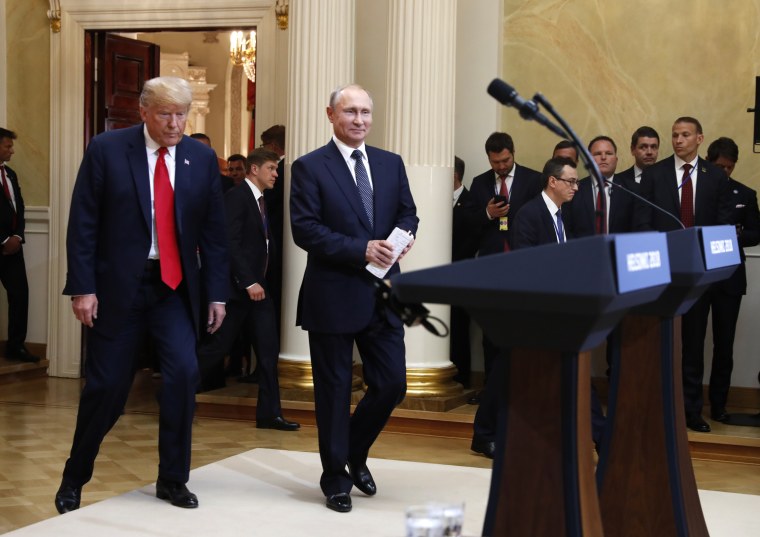On too many occasions, Donald Trump has made clear he has little use for the findings of U.S. intelligence agencies. It raises the question of who, exactly, has the president's ear on matters of national security and international affairs.
In some instances, Trump clearly finds it useful to follow the guidance of commentators in conservative media. In other instances, the Republican prefers to make snap judgments, relying on his "gut," even in areas in which he has no knowledge or background.
But then there are the examples of Trump listening to the one source he seems to trust implicitly: Russian President Vladimir Putin.
When Trump canceled military training exercises with our South Korean allies, the decision came after Putin suggested it. When the FBI tried to brief the American president on the capable range of North Korean ballistic missiles. Trump rejected their findings -- because, by one account, he'd received competing information from the Russian president.
And the Republican has long been convinced that Ukraine intervened in the U.S. elections in 2016 in the hopes of undermining his candidacy. As the Washington Post reported in a striking new piece, Trump appears to have gotten this false idea from his benefactor in Moscow, too.
Almost from the moment he took office, President Trump seized on a theory that troubled his senior aides: Ukraine, he told them on many occasions, had tried to stop him from winning the White House.After meeting privately in July 2017 with Russian President Vladimir Putin at the Group of 20 summit in Hamburg, Trump grew more insistent that Ukraine worked to defeat him, according to multiple former officials familiar with his assertions.The president's intense resistance to the assessment of U.S. intelligence agencies that Russia systematically interfered in the 2016 campaign -- and the blame he cast instead on a rival country -- led many of his advisers to think that Putin himself helped spur the idea of Ukraine's culpability, said the officials, who spoke on the condition of anonymity to describe internal discussions.
The Post quoted one former senior White House official who said Trump was quite explicit on this point, saying he knew Ukraine was the real culprit, U.S. intelligence be damned, because "Putin told me."
I think it's safe to say those are three words this president should never utter, especially as he embraces the point of a Kremlin-backed disinformation campaign intended to advance Russian interests.
Nevertheless, let's not lose sight of the larger context: Trump not only believed Putin, he also acted on that belief, pressing Ukrainian President Volodymyr Zelensky to pursue, among other things, a crackpot conspiracy theory about Ukraine's role in American election interference. This was, of course, a key element of the infamous July 25 call between the two leaders.
Or put another way, Putin whispering in Trump's ear that Ukraine meddled in the 2016 election was, by some measures, one of the first dominoes that ultimately contributed to the American president's impeachment.
What's more, as Rachel highlighted on last night's show, the developments are ongoing. There are pending criminal cases against Lev Parnas and Igor Fruman -- two Rudy Giuliani associates -- who are accused of, among other things trying to help advance Trump's Ukraine scheme. Indeed, Giuliani himself is reportedly under criminal investigation, and he's spent much of December in eastern Europe, trying to dig up related dirt.
Common sense suggests it might occur to Trump, at some point, that believing Putin's deceptions and ignoring the findings of American intelligence professionals gets him into a fair amount of trouble. And yet, for reasons the White House hasn't explained, Trump can't seem to help himself.
